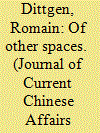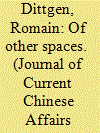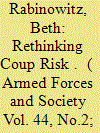|
|
|
Sort Order |
|
|
|
Items / Page
|
|
|
|
|
|
|
| Srl | Item |
| 1 |
ID:
181110


|
|
|
|
|
| Summary/Abstract |
Since the early 2010s, the global migrant crisis has led to the mass inflow of foreign migrants, refugees, and other displaced persons into numerous countries. Whereas some native citizens have welcomed these migrants, a large number have expressed opposition. Most theories explaining why citizens express opposition to migrants emerged from evidence collected in developed, European countries. Yet, developing, non-Western countries especially in the Middle East and North Africa (MENA) have borne the brunt of today’s migrant crisis. This study uses an original survey of 1500 citizens conducted in Morocco’s Casablanca-Settat region to explore how effectively traditional theories explain opposition to migrants amongst citizens of the MENA. Like those in many North African countries, Morocco’s migrants hail mostly from Arab countries (e.g. Syria, Iraq) or sub-Saharan African countries (e.g. Nigeria, Congo). We find the expected citizen opposition to migrants, but also that this opposition is more intense with respect to migrants from sub-Saharan Africa. While recent studies of Europe emphasize how cultural differences drive opposition to migrants, our results indicate that material issues—concerns about migrants’ negative effects on the economy and internal security—tend to motivate such attitudes in Morocco. Concerns about cultural conflicts and other immaterial differences play a smaller, secondary role.
|
|
|
|
|
|
|
|
|
|
|
|
|
|
|
|
| 2 |
ID:
137195


|
|
|
|
|
| Summary/Abstract |
Chinese economic activities in Africa have gained increased visibility in parallel to the recent acceleration of Sino-African relations. This paper, which is framed from a geographical perspective that is often absent or neglected in studies covering China–Africa, focuses on the spatial forms and dynamics. It depicts the way in which two contrasting Chinese economic entities – a state-owned company in Chad and privately owned commercial malls in Johannesburg, South Africa – engage with their respective host environments. While drawing on concepts of “liminality” as well as “heterotopias”, I argue that the modalities of the Chinese footprint are characterised both by closure and interaction, creating a dynamic tension that produces its own set of unique practices. This ambivalence between enclave and active linkages with host societies is not only perceivable from a spatial point of view, but also emerges with regard to economic strategies. In the midst of a transitional period, along with a launching and a consolidating phase, the Chinese economic entities in both case studies show signs of change in terms of behaviour and territorial foothold.
|
|
|
|
|
|
|
|
|
|
|
|
|
|
|
|
| 3 |
ID:
137196


|
|
|
|
|
| Summary/Abstract |
Chinese economic activities in Africa have gained increased visibility in parallel to the recent acceleration of Sino-African relations. This paper, which is framed from a geographical perspective that is often absent or neglected in studies covering China–Africa, focuses on the spatial forms and dynamics. It depicts the way in which two contrasting Chinese economic entities – a state-owned company in Chad and privately owned commercial malls in Johannesburg, South Africa – engage with their respective host environments. While drawing on concepts of “liminality” as well as “heterotopias”, I argue that the modalities of the Chinese footprint are characterised both by closure and interaction, creating a dynamic tension that produces its own set of unique practices. This ambivalence between enclave and active linkages with host societies is not only perceivable from a spatial point of view, but also emerges with regard to economic strategies. In the midst of a transitional period, along with a launching and a consolidating phase, the Chinese economic entities in both case studies show signs of change in terms of behaviour and territorial foothold.
|
|
|
|
|
|
|
|
|
|
|
|
|
|
|
|
| 4 |
ID:
160979


|
|
|
|
|
| Summary/Abstract |
Military interventions continue to be prevalent in Africa. In the 21st century alone, 14 coups have been successfully staged. Whereas most studies of coup risk examine how militaries are organized or what structural conditions are associated with coups, we take a novel approach. We explore how coalition politics relate to coup risk. It has long been observed that regimes try to hold power by buying off urban consumers. We argue that focusing on urban consumers actually makes regimes more prone to military intervention. Instead, leaders who ally with established rural elites are more effective at thwarting coups. To test our hypothesis, we develop a unique data set of rural political strategies, coding regimes in 44 sub-Saharan countries from 1960 to 2000. Using a continuous-time Cox proportional hazards regression model, we find a robust correlation between policies supportive of rural elites and lower coup risk.
|
|
|
|
|
|
|
|
|
|
|
|
|
|
|
|
|
|
|
|
|